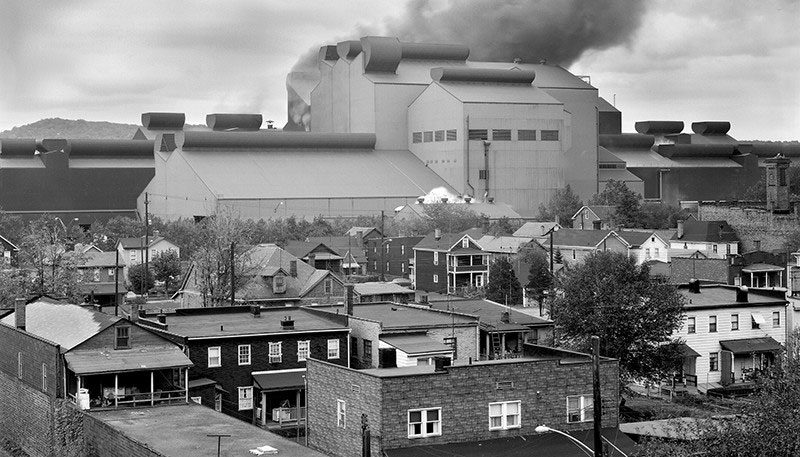In the mid-1970s, I had a grant from LightWorks at the University of Syracuse to photograph the mill towns north of Pittsburgh where I was born and raised, and then make platinum prints of the images. As I wandered the streets of those tough little towns with my 4×5 view camera, twenty years after I had left the area, I realized I was looking for images that to me captured the very essence of a mill town—the most representative five & ten; the most typical house on a slanted street—that in effect I was constructing my own idea of a mill town. When I later went to write text to go along with the images, I called my made-up town Iron City, after a local beer, but even then I knew the name wasn’t right. Later still, after I recognized that I could never capture with non-fiction my feelings about the area—that the area was crying out to me, or maybe I was crying out to it, to try to capture what I felt about this place in fiction— I also recognized where I would locate my story of building a high-rise building in a mill town.
I’m not sure at this point where or how I came up with the name Furnass. I know I had recently read Thomas Bell’s rediscovered novel, Out of This Furnace, the story of three generations of Slovakian immigrants working in the steel mills around Pittsburgh, and the name Furnace was appealing in its symbology as an agent for hardening character, etc. But my experiences with the mills and mill towns was very different than the ones Bell portrayed. For me, the mills were certainly an everyday fact of life when I was growing up—the playground at my grade school butted up against the tube mill of B & W steel; from my attic window I could watch molten slag dumped down the hillside across the river; whenever it was about to rain the smoke from the mills didn’t rise, shrouding the town in grit and darkness; when we hitchhiked to high school we were dependent on the mill hands driving to or from their shifts. But I grew up on College Hill, a better place to live in Beaver Falls; I had friends whose fathers worked in the mills but my father was a professional man, a Certified Public Accountant commuting each day to his office in Pittsburgh. I was a cake-eater in the eyes of my Italian girl-friend’s millworker uncles. A funny term for an unfunny class distinction. The books of the Furnass Series were not so much about life in the mills as they were about life in the towns around the mills, and how the heat and pressure of that way of life came to test and harden the characters. But, as applicable and descriptive as the name might be, actually calling the town Furnace seemed obvious and heavy-handed.
(to be continued)

